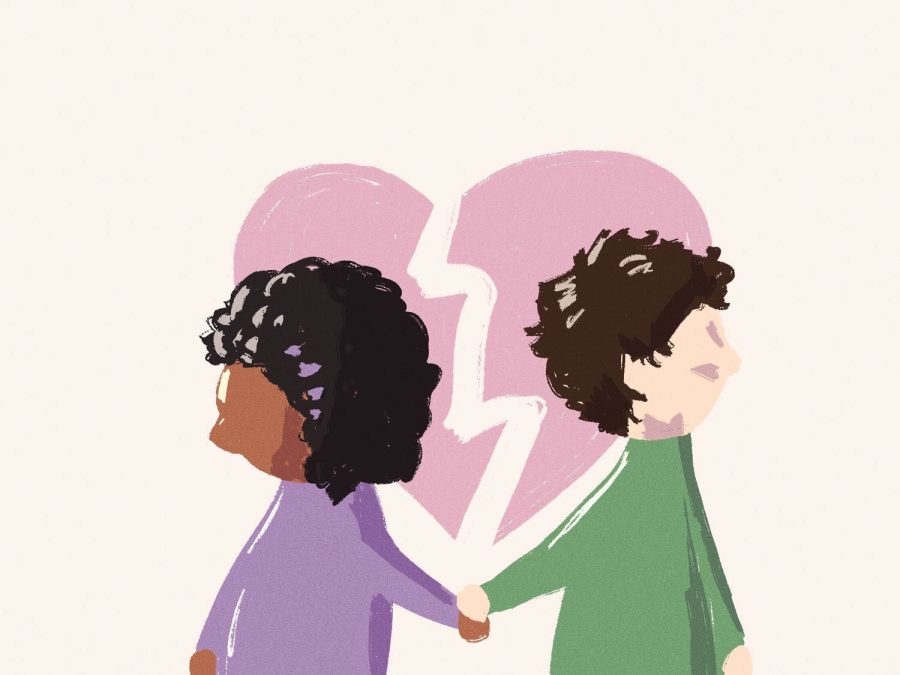Red vs. green flags: signs of an unhealthy relationship
ATVP offers several resources for relationships
Relationships exist on a spectrum of healthy to abusive.
February 9, 2023
Editors note: Julia Albert is on the violence prevention team with the Women’s center, not Alternative to Violence on the Palouse. Corrected on: 9:46 a.m 2/9
Romantic relationships are not always entirely healthy or toxic, but rather they exist on a spectrum from healthy to abusive, and can change over the course of a relationship. It is important to know the signs of a potentially abusive relationship.
Domestic violence is an umbrella term that encompasses more than just physical and sexual assault, and is rooted in maintaining power and control over someone else, Kateisha Moreno, coordinator of Domestic Violence Services for Alternatives to Violence of the Palouse (ATVP), said.
Domestic violence can include things like manipulation, gaslighting, financial control and isolation. Gaslighting is when someone is trying to get you to question your own perception of reality, she said, like a partner denying that they did something when, in reality, they actually did.
Moreno said unhealthy and abusive relationships occur on a spectrum called the “power and control wheel,” which lists different traits that are unhealthy or abusive in a relationship, romantic or otherwise.
“The power and control wheel really tells you what are red flags in relationships. So of course, if someone’s controlling your daily activities … who you can and can’t be friends with, where you can and can’t go, the way you can and cannot dress. If they’re manipulating or gaslighting you,” she said.
Relationships can fluctuate, but you never want them to fall into the abusive category, Moreno said. Relationships that have a breakdown in communication or aspects of unhealthy communication can become healthy relationships again with proper communication.
In healthy relationships, boundaries are respected, she said, whether that is a romantic relationship, friendship or parent-child relationship. While all relationships have issues, communication should not be degrading and should aim for problem-solving discussion and coming to a mutual understanding on conflicts.
A key part in having healthy relationships is consent. Consent may most often be talked about in relation to sexual activity or at the beginning of a relationship as a couple figures out their likes and dislikes, but it is important to talk about consent at all stages of a relationship according to the National Domestic Violence Hotline.
Consent can come in many forms, said Julia Albert, WSU Women*s Center violence prevention coordinator.
At the most basic level, children can be taught body consent, for example, if you are comfortable with someone hugging you or not. In college, sexual consent is typically talked about and there are no “gray areas” when it comes to consent, she said.
“Sexual consent, which would be in any case an enthusiastic yes. It comes down to, are you a willing participant who is actively and enthusiastically saying yes. It’s not persuasion. It’s not coercion. It’s not by force,” Albert said.
You are either able and willing to consent, which includes being sober, or you are unable to consent, she said.
ATVP has resources available for those who are in abusive relationships or are worried their relationships are unhealthy. A 24-hour hotline, (208) 883-HELP or (509) 332-HELP, is available for those who have a loved one in unhealthy relationships or need to discuss their own relationships, she said. Even if the relationship is not abusive, the hotline is still a resource for trained advocates to talk someone through their concerns.
ATVP also has an emergency domestic violence shelter for those facing homelessness due to abusive situations and legal advocates, Moreno said. Those who are facing homelessness due to abusive situations should call the hotline. ATVP has offices on the WSU campus, at the Whitman County Courthouse, in Moscow and on the U of I campus.
There is also support available on the WSU Campus. The Women*s Center is a resource for all students, Albert said. The center offers services like Cougar Safe Rides, contraceptives including Plan B, menstrual products and a nursing room for students.
If someone is worried they are in an unhealthy or abusive relationship, they should reach out for help to resources like the National Domestic Violence Hotline, ATVP, or friends and family, Moreno said.
“Because a lot of people, when they’re in these situations, they may feel isolated. They may feel like no one will understand. But if they’re reaching out for help, they will see that it’s not their fault. What [the partner is] doing is not okay, and they can get help,” she said.





















